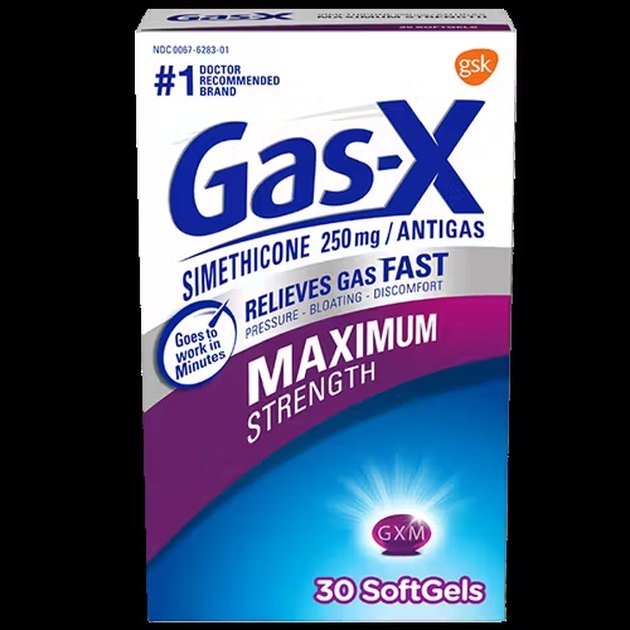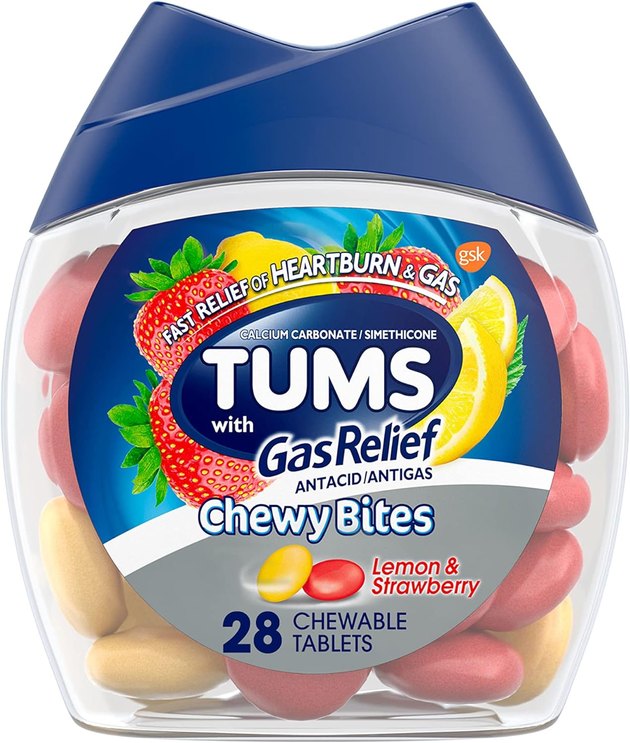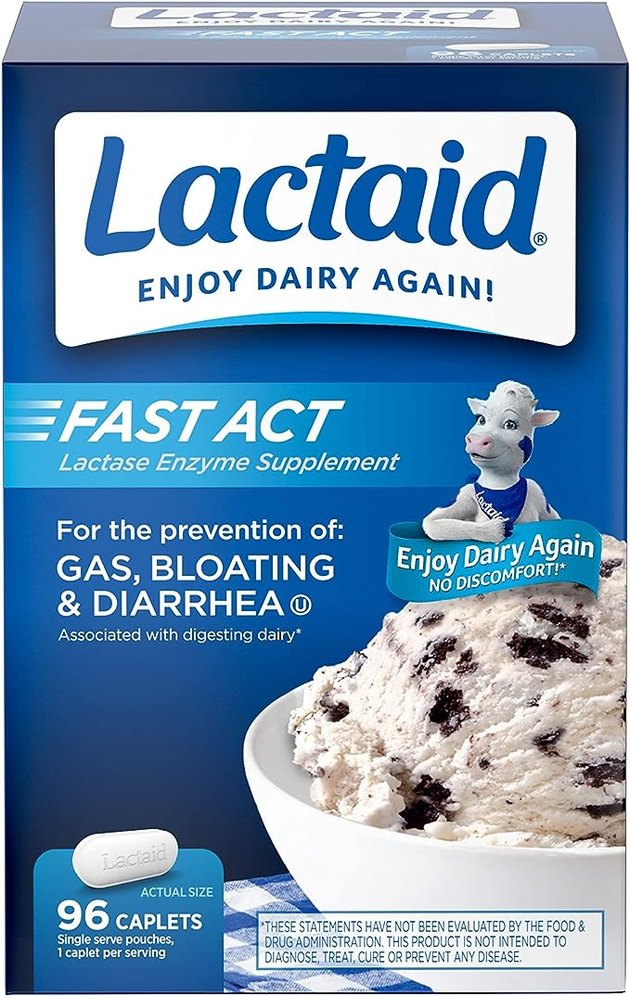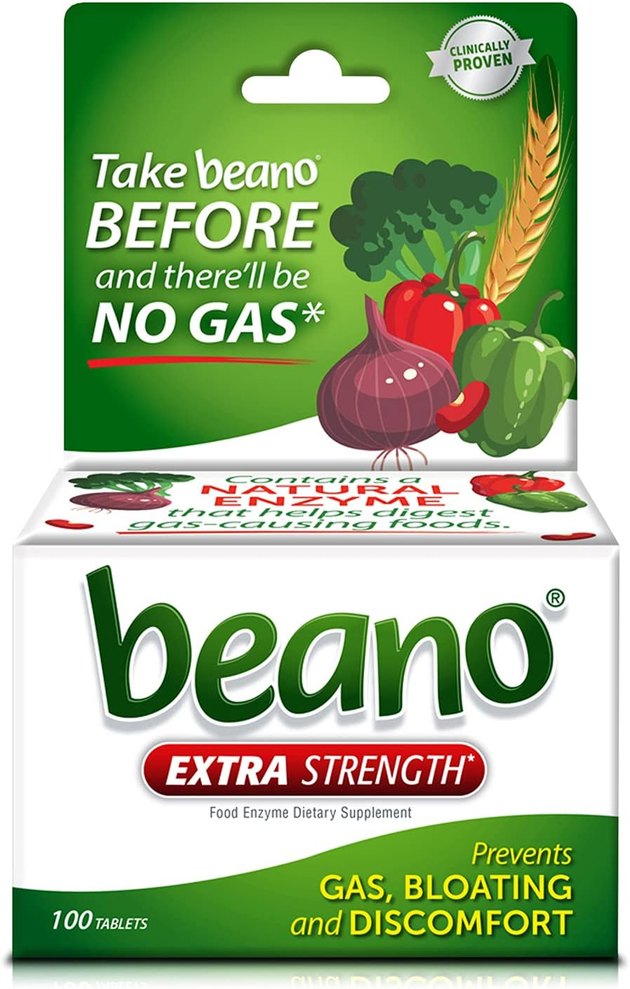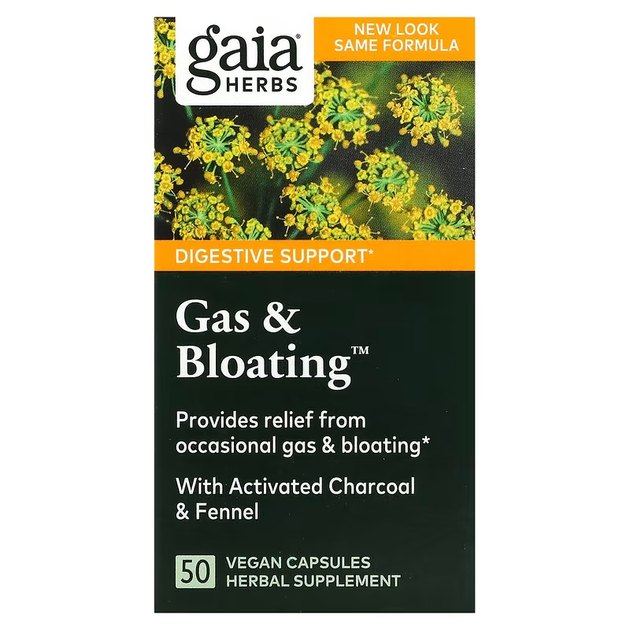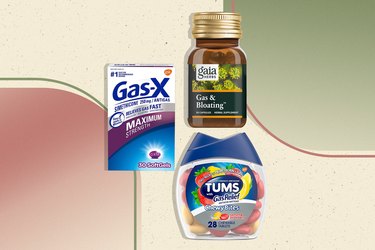
Gas can result in bloating, burping, cramping and a slew of other uncomfortable side effects that are not only embarrassing but also very common.
Sometimes you can find gas pain relief in a cup of hot herbal tea, or through stretching, getting some exercise or giving yourself a gentle belly massage.
Video of the Day
Video of the Day
But if those natural remedies don't do the trick, an over-the-counter anti-gas medication might help.
OTC gas medicines usually work in one of two ways: by preventing gas in the first place or stopping gas in its tracks once you're burdened by it.
"Everyone makes gas in their gut, but some people make more than others and some people can't move it along and out," says Jacqueline L. Wolf, MD, a gastroenterologist and associate professor of medicine at Harvard Medical School. "OTC gas medications either help decrease the gas or move it out."
Here are the best anti-gas medications that contain these stomach-soothing ingredients.
The Best Anti-Gas Medicines
- Best Overall: Gas-X Maximum Strength ($10.48, Amazon)
- Best for Acid Reflux and Gas: Tums With Gas Relief ($4.99, Amazon)
- Best for Lactose Intolerance: Lactaid Fast Act ($20.79, Amazon)
- Best for Preventing Gas: Beano Extra Strength ($11.05, Amazon)
- Best Natural: Gaia Herbs Gas & Bloating ($22.01, Amazon)
How We Chose
We researched the most popular anti-gas meds and spoke to two gastroenterologists about what ingredients to look for according to your specific symptoms. We used our experts' insights to help us choose the best meds on the market according to how effective they are and how widely available they are.
Read more about how we choose and cover products here.
1. Gas-X Maximum Strength
The active ingredient in Gas-X is simethicone, an effective anti-gas medication available without a prescription.
"Simethicone helps small gas bubbles come together and form larger gas bubbles so they can pass more easily through the gut," says Jeffrey H. Garelick, MD, a gastroenterologist based in West Palm Beach, Florida.
Simethicone is fast-acting and often starts working within 30 minutes, per the NHS.
One Gas-X maximum-strength tablet contains 250 milligrams of simethicone — the upper limit is 500 milligrams per day — so you can expect to find relief from painful trapped gas relatively quickly after taking it.
Gas-X is also available in Extra Strength (125 milligrams of simethicone) and Ultra Strength (180 milligrams of simethicone), and comes in both tablets and chewables (which are actually pretty tasty).
What's more, Gas-X is widely available in many pharmacies across the country. It's also safe to take during pregnancy, when people may experience gas more often.
2. Tums With Gas Relief
Sometimes acid reflux can be accompanied by gas — and in that case, you'll need an antacid combined with gas relief.
These Tums With Gas Relief chewy bites come in a tasty lemon-strawberry flavor and they work to relieve indigestion, which often results in symptoms including heartburn, gas and a sour stomach.
This OTC med contains two active ingredients: calcium carbonate (750 mg) to relieve heartburn and simethicone (80 mg) to help with gas.
Tums With Gas Relief is also safe for pregnant people.
But talk to your doctor before taking this med if you're on any prescription medications, because calcium carbonate may interact with certain drugs. And keep in mind that calcium carbonate may cause constipation for some people, per the Mayo Clinic.
3. Lactaid Fast Act
Sometimes gas is a result of your body not being able to digest certain foods. And that's the case with lactose intolerance, which affects about 68 percent of the population and becomes more common as we age, per the National Institutes of Health.
People with lactose intolerance lack the enzyme lactase, which breaks down lactose into two sugars called galactose and glucose, Dr. Wolf says. If the lactose can't be broken down in the small intestine (as is the case with lactose intolerance), then it travels to the large intestine where the resident bacteria will break down the lactose and cause gas and/or bloating, she says.
If lactose intolerance causes you gas, try taking Lactaid with your first bite of anything containing dairy (think: cheese, yogurt, ice cream). Lactaid is a digestive enzyme supplement that contains the enzyme lactase to help your body properly break down lactose, Dr. Garelick says.
That said, this product probably won't work if your gas doesn't stem from a lactose deficiency — if that's the case, you're better off with a simethicone product like Gas-X.
Lactaid Fast Act comes in both caplet form and vanilla-flavored chewables.
4. Beano Extra Strength
If you find that beans or certain veggies like broccoli and cauliflower are the root cause of your gas, try Beano.
"Beano contains a natural enzyme called alpha-galactosidase that helps break down complex carbohydrates in gassy foods like fresh vegetables and whole grains, which are typically hard to digest and therefore produce gas," Dr. Garelick says.
This OTC pill works preemptively, so you'll take two tablets right before a meal to help prevent gas. And it comes in a tablet that you swallow or a strawberry-flavored tab that you let dissolve on your tongue.
Just note that Beano doesn't work as well if you take it after a meal, so if you forget to pop one, you might be better off with a simethicone product like Gas-X.
5. Gaia Herbs Gas & Bloating
If you're looking for a natural alternative to gas medicines, you might opt for a product that contains activated charcoal, like this supplement from Gaia Herbs. Activated charcoal works by trapping gas molecules and reducing the gas that causes bloating, Dr. Wolf says.
Gaia Herbs supplements are produced in a Good Manufacturing Practices (GMP) facility, which means they meet the FDA's quality standards.
Along with activated charcoal, this supplement contains fennel, which is linked to helping reduce gas, per Kaiser Permanente.
However, activated charcoal can bind to medications and prevent their absorption in your body — so if you're on any meds, make sure not to take this supplement or any others containing activated charcoal before getting the OK from your doctor.
What to Look for in Gas-Relief Medicine
The following ingredients are effective for gas relief, although they work in different ways:
1. Simethicone
The active ingredient in anti-gas medications is usually simethicone, which is approved by the U.S. Food and Drug Administration (FDA) for relieving gas.
"Simethicone has been used in people where the gas seems to stay in one place and not move," Dr. Wolf says. "The simethicone turns little gas bubbles into big bubbles in the gut to allow the gas to pass better, but it does not prevent the gas from forming."
The dose is 60 to 125 milligrams four times a day, after meals and at bedtime, and you shouldn't exceed 500 milligrams in 24 hours.
2. Activated Charcoal
There are limited studies showing that activated charcoal helps relieve gas, Dr. Wolf says.
Activated charcoal is made by heating charcoal to make it more porous. "The extra spaces in the charcoal trap gas molecules, reducing the gas that causes bloating," Dr. Wolf says.
However, this natural gas relief ingredient doesn't come without its warnings and side effects.
If you take medication, activated charcoal has the potential to bind to your meds, preventing some of their absorption into the body, Dr. Wolf says. If you're on any medication, make sure to talk to your doctor before taking activated charcoal as it may not be right for you.
What's more, activated charcoal can turn the tongue and stool black and potentially cause constipation, Dr. Wolf says.
3. Digestive Enzymes
Lactase
If you have lactose intolerance, taking the enzyme lactase can help your body break down the lactose in dairy, Dr. Wolf says. That can help you avoid gas that's often associated with lactose-containing foods, including milk, ice cream, soft cheeses and certain desserts.
Alpha-Galactosidase
Alpha-galactosidase comes in handy when our bodies cannot break down all the sugar and fiber in foods like beans and root vegetables.
"These foods go into the colon where they are broken down by bacteria and may produce gas," Dr. Wolf says.
Alpha-galactosidase in some over-the-counter enzyme pills may help decrease gas production, but you have to take it before and during the meal, she says.
When to See a Doctor
While anti-gas meds are safe to take, being reliant on them might signal a larger issue that warrants a visit to your gastro. "Patients should seek the care of a physician for persistent gas symptoms that do not respond to over-the-counter medications," Dr. Garelick says.
If you experience severe gas that disrupts your everyday life, schedule a visit with your gastroenterologist. More serious complications associated with gas that warrant a visit to your doctor include:
- Unexplained weight loss
- Fever or chills
- Altered bowel habits, particularly with blood
Is this an emergency? If you are experiencing serious medical symptoms, please see the National Library of Medicine’s list of signs you need emergency medical attention or call 911.
